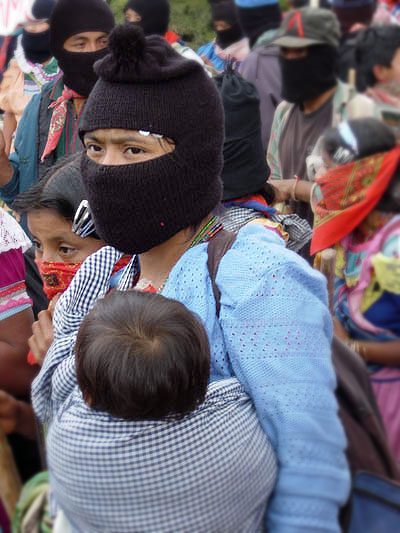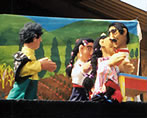2002
02/01/2003ANALYSIS: Resistance and autonomy, the creation of the zapatista juntas of good government
29/08/2003
Accompaniment
- In December we went to the northern zone of Chiapas. We also visited San Jerónimo Tulijá, in the autonomous Zapatista municipality “Ricardo Flores Magon” to see what has happened since the violent conflicts of last August occured; and make contacts so that we might visit people who have been expelled from their communities as a consequense of the violence. At Palenque, we again visited the lawyer from the Human Rights PRO (“PRODH”) center who was threatened some months ago.
- Since October 2002 we have been working with “Alianza Cívica” Chiapas in coordinating a project with puppets. We collectively created two plays on communitarian divisions and conflicts and the relevance of respecting diversity. The plays are now being shown to indigenous communities to promote mediation on such themes as peaceful conflict resolution. The first show was at Chenalhó, as part of the programmed activities to celebrate the anniversary of the civil group “Las Abejas”, and the fifth anniversary of the Acteal massacre. We had our first trip to the Northern zone in February (see the separate article)
- In December we visited the Comitan shelter for the seven families that were expelled last year from the Montes Azules biosphere. They are still waiting for the government to comply with its promise to provide them sufficient fertile land so that they can support their families.
Inter-religious Dialogue
- In November 2002 we began the development of the training stage for those Commissioned for Peace at Chenalhó through a monthly workshop. There are between 30 and 50 religious leaders, mainly Catholics and Presbyterians.
- We attended the inauguration of Instituto de Estudios Sociales e Interculturales (INESIN), successor of the former Bible School of Integral Formation of San Cristobal de las Casas.
- We were part of the panel dealing with religious problems in Chiapas that was organized by Foundation Leon XIII in San Cristobal.
Peace Education
- In January we participated in the organization and cooperation for the third Forum on Communitarian Peace and Reconciliation that was organized by the Peace network in Chiapas. There was the collaboration of around 200 persons from the various communities and regions of the state.
- In February we held a workshop on communitarian divisions and Neoliberal projects for the Second Chiapanecan Forum vis-à-vis Neoliberalism that was held in New Huixtán (Las Margaritas). We also presented a puppet play to encourage participants to reflect on the subject.
- We participated in follow-up meetings of the National Encounter for Peace as well as in preparatory meetings of for the World Forum against Militarization that will be held this May in San Cristobal.
- We started a new cycle of workshops on Peace Culture with the youth of the San Cristobal CEDECOS’ (Centers of Communitarian Development).
Contacts and Information
- We were visited by delegations, students, and journalists that were informed on the current situation in Chiapas and the work of Sipaz.
- We participated in the organization and guidance of a formative program for the World Education delegation to inform them of the various indigenous communities and visions of the Chiapas conflict.
- In February, we attended the First Regional Forum of Tseltal Women of the Ocosingo municipality.
International
- At the end of January, we participated in the third World Social Forum in Porto Alegre (Brazil).
- In February the Steering Committee and the SIPAZ team met in Chiapas to evaluate the work and analyze the existing political opportunity, as well as prepare a strategic plan for 2003.
- We assisted in organizing and providing facilities for a Survey of Latin American Women Constructors of Peace that was called by the IFOR (member of the SIPAZ coalition) held in Quito, Ecuador at the end of February.



